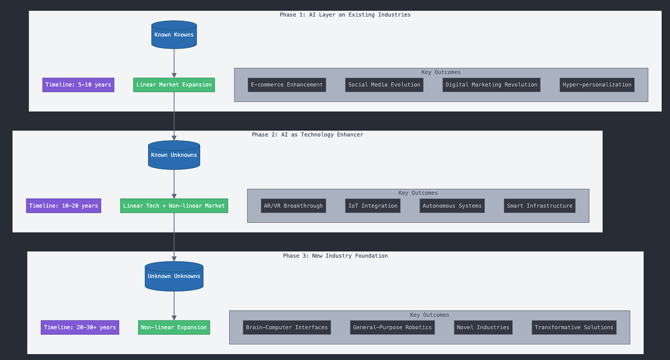Fourweekmba
1d
101

Image Credit: Fourweekmba
Google’s AI Strategy
- Google has consolidated more AI teams into its London-based DeepMind division to streamline development and enhance its AI research-to-deployment pipeline. This re-org aims to make Google’s Gemini AI rival ChatGPT with a target of 500 million users by 2025.
- The goal is to create a future defined by a completely different business unit, that will become a whole new player in an industry we can’t imagine today. Google is reorganizing around AI with Gemini and DeepMind to defend search dominance and attack emerging markets.
- The transition from technical implementation to full-scale business transformation leads to organizational redesign, cultural shifts, and business model evolution. The shift to end-to-end models could propel autonomous driving closer to seamless, safe deployment at scale.
- The emergence of AI as a horizontal enabling layer is driving an economic supercycle and reshaping industries. Businesses must adapt as AI evolves from a feature to a core business form factor, requiring rapid shifts to defend and attack markets.
- The multi-cycle of AI integration demands organizations to progress from task-based automation towards an AI-first mindset. Business models must be transformed and redesigned based on cross-functional collaboration, innovation hubs, and removing traditional boundaries.
- Assuming Google doesn’t survive as a search giant, it might transform into something else. Waymo, powered by Gemini and EMMA, demonstrates Google’s potential transformation from a search engine to an autonomous systems leader.
- Google balances defending its core, attacking new opportunities, and creating future-focused business units. Its investments in Waymo and AI infrastructure position it to thrive in autonomous driving and other industries beyond 2030.
- The revolutionary new technology threatens to redefine the search industry into what Gennaro Cuofano has called “cognitive discovery.” Google aims to defend search dominance and attack emerging markets, while creating a future-focused business unit with new revenue streams and market leadership beyond 2030.
- Google aims to scale Waymo, integrate EMMA, enhance Maps technology, and build AI infrastructure. The ultimate goal is to create a future defined by a completely different business unit, that in the meantime we’ll become a whole new player in an industry we can’t imagine today.
- The reorganization of Google around Artificial Intelligence with Gemini and DeepMind is aimed at defending search dominance and attacking emerging markets. The company’s investments in technology and infrastructure position it to thrive in self-driving car systems and other industries beyond 2030.
Read Full Article
6 Likes
For uninterrupted reading, download the app